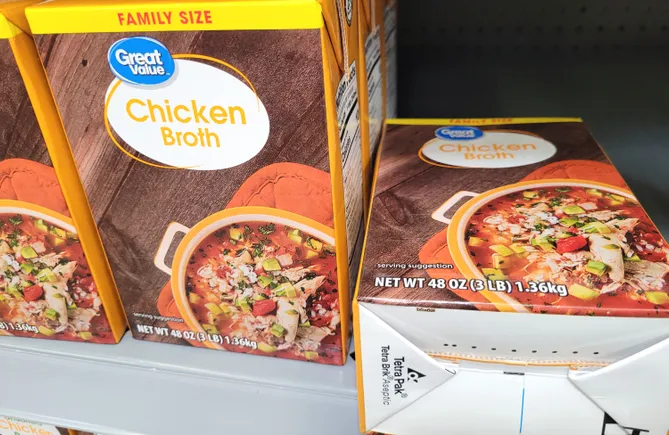Dive Brief:
- TreeHouse Foods, the company that makes Walmart’s Great Value chicken broth that’s part of a recall, said via email that the recent issue is because of an “internal procedural error that has been corrected” and not the packaging materials. The U.S. Food and Drug Administration said in its notice from Dec. 11 that the recall was due to the “[p]otential for packaging failures that could compromise the sterility of the product, resulting in spoilage.”
- The FDA’s notice shows the recall covers 2,023 cases, with 120 cases per pallet — or about 17 pallets worth of product. At six units per case, more than 12,100 cartons are affected. Walmart posted this item on its recall website Jan. 14; it shows the 48-ounce cartons of Great Value broth affected were sold in nine states.
- Tetra Pak supplies the aseptic cartons for the broth. The company is aware of the recall, but it cannot comment on procedural operations outside its own, a spokesperson said via email. “We can only share that we are not aware of any procedural issues specific to our operations,” the spokesperson said. “It is worth noting that a recall has not been issued for our packaging material.”
Dive Insight:
Demand for private label food offerings has surged amid inflation concerns in the U.S. the last few years, with private label sales reaching a record high of $271 billion in 2024. TreeHouse foods is the largest pure-play private label manufacturer in the United States. Besides Walmart, its customers include Aldi, Amazon, Costco, Kroger and Target.
TreeHouse is no stranger to recalls, including for broth. It was at the heart of the bone broth recall at retailers such as Costco and Walmart, starting in September 2023, that contributed to an 8% drop in fourth-quarter sales that year. Repercussions stretched well beyond then, with the company reporting it experienced an impact to “results of operations throughout the first nine months of 2024.”
FDA recalls typically are not caused by packaging-related issues, said George Misko, senior partner at Keller & Heckman, speaking about recalls in general. “It’s very seldom that you see an issue with a package that causes the actual problem that requires some type of a recall,” Misko said. “It’s more common to see issues in the production process — that may involve the equipment that was used to package something.”
TreeHouse voluntarily recalled the Great Value broth in question — as is the case with most recalls, Misko said. “It’s very seldom that that FDA gets into a pushing match with a company over whether a recall is going to be done,” he added.
In its email, TreeHouse described the recall as “very small.” TreeHouse also said that it is “normal to have occasional deviations during production that can cause an out-of-specification result.”
Tetra Pak similarly characterized the recall as affecting a “limited amount” of product. “Food safety and quality remains our top priority, and we cooperate fully in reviews and investigations,” the Tetra Pak spokesperson said.
Misko, who is part of Keller & Heckman’s FDA practice group that specializes in packaging, said the aseptic cartons in the Walmart recall are a “pretty sophisticated type of package. … So those companies that make that kind of product tend to be very careful in terms of what they’re doing and in watching for problems with the product as it’s being produced.”
He stressed that packaging-related recalls are rare, and he’s seen very few in his more than 30 years of experience in the space.
The FDA notification lists the TreeHouse recall as “unclassified,” which suggests the agency is still investigating, but the problem likely does not pose an imminent, serious threat to the public, Misko explained.
He described FDA’s three-tiered recall system, with Class One signifying “there’s a reasonable probability that use or exposure to the product will cause serious adverse health consequences or death.” An example of that could be a product with a known listeria contamination. Class Two indicates a contaminated product might cause temporary illness or discomfort. A Class Three recall is of even lesser seriousness; it could result from a situation of no known contamination but a minor impact such as the possibility for a product’s smell or taste to be off.
FDA requires that product manufacturers and retailers disseminate information quickly and in a widespread manner when it comes to Class One recalls, Misko said. Considering the TreeHouse broth recall is still “unclassified” and public notifications weren’t known widely until almost a month after the date listed on the FDA notification, the seriousness is likely low.
Cosmetics and food product recalls are on the rise, with the FDA reporting that the last fiscal year had the most since 2019. Recalls also are getting more granular as traceability and communication about them is more effective, according to WGBH. That means some small recalls that previously wouldn’t make the public radar are now garnering more attention.
There’s also a lot more company and public sensitivity to such matters now, Misko said. “Food safety has become such a hot topic in the last decade or decade-and-a-half,” he said.





